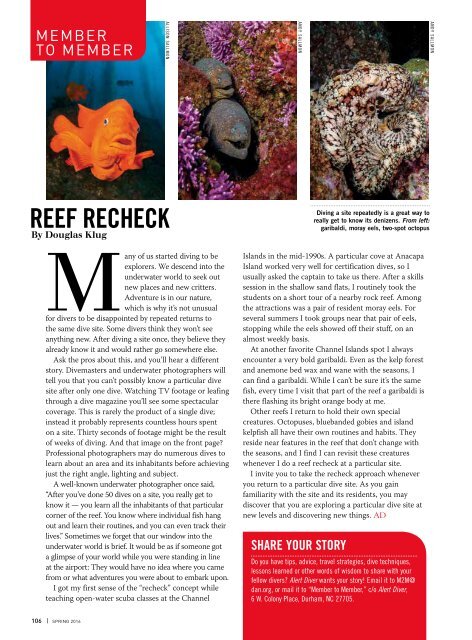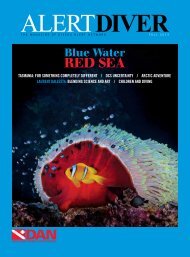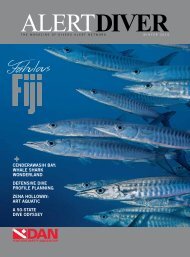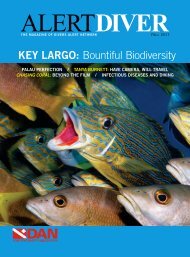AD 2016 Q2
As we pointed out in the spring 2013 edition of the Alert Diver, even being a dive buddy has potential legal implications. So, to bump this up a notch, what about the diver training organisations themselves? Where do they stand? How do they relate to South African law? Are they all considered the same under our legal system in spite of the differences in organisational structures and training programmes? How does this affect their respective instructors and trainee divers from a legal perspective? These are not exactly simple questions. It is certainly true that the respective training organisations differ in a number of ways. However, this does not imply that there are necessarily differential legal implications for each of them. In fact, under South African law, the legal principles are common in all matters. Therefore, if you suffer a loss and you (or your estate in the case of a fatality) wish to recover damages, the legal principles would be applied commonly; whether you are driving or diving. Although not a frequent occurrence, there have been quite a number of law suits associated with diving injuries and damages in South Africa. This is not surprising, as the occurrence of law suits is really a function of “numbers”. As training increases, so do the chances of injuries and, with it, the chances of legal recourse. So, it remains wise to insure yourself, your equipment or your business in a proper and effective way. But before getting back to the potential differences amongst the training agencies, let’s first explore the foundational legal principles on which any civil claim would be adjudicated: inherent risk, negligence and duty to take care.
As we pointed out in the spring 2013 edition of the Alert Diver, even being a dive buddy has potential legal implications. So, to bump this up a notch, what about the diver training organisations themselves? Where do they stand? How do they relate to South African law? Are they all considered the same under our legal system in spite of the differences in organisational structures and training programmes? How does this affect their respective instructors and trainee divers from a legal perspective? These are not exactly simple questions.
It is certainly true that the respective training organisations differ in a number of ways. However, this does not imply that there are necessarily differential legal implications for each of them. In fact, under South African law, the legal principles are common in all matters. Therefore, if you suffer a loss and you (or your estate in the case of a fatality) wish to recover damages, the legal principles would be applied commonly; whether you are driving or diving.
Although not a frequent occurrence, there have been quite a number of law suits associated with diving injuries and damages in South Africa. This is not surprising, as the occurrence of law suits is really a function of “numbers”. As training increases, so do the chances of injuries and, with it, the chances of legal recourse.
So, it remains wise to insure yourself, your equipment or your business in a proper and effective way. But before getting back to the potential differences amongst the training agencies, let’s first explore the foundational legal principles on which any civil claim would be adjudicated: inherent risk, negligence and duty to take care.
You also want an ePaper? Increase the reach of your titles
YUMPU automatically turns print PDFs into web optimized ePapers that Google loves.
MEMBER<br />
TO MEMBER<br />
ALLISON SALLMON<br />
ANDY SALLMON<br />
ANDY SALLMON<br />
REEF RECHECK<br />
By Douglas Klug<br />
Many of us started diving to be<br />
explorers. We descend into the<br />
underwater world to seek out<br />
new places and new critters.<br />
Adventure is in our nature,<br />
which is why it’s not unusual<br />
for divers to be disappointed by repeated returns to<br />
the same dive site. Some divers think they won’t see<br />
anything new. After diving a site once, they believe they<br />
already know it and would rather go somewhere else.<br />
Ask the pros about this, and you’ll hear a different<br />
story. Divemasters and underwater photographers will<br />
tell you that you can’t possibly know a particular dive<br />
site after only one dive. Watching TV footage or leafing<br />
through a dive magazine you’ll see some spectacular<br />
coverage. This is rarely the product of a single dive;<br />
instead it probably represents countless hours spent<br />
on a site. Thirty seconds of footage might be the result<br />
of weeks of diving. And that image on the front page?<br />
Professional photographers may do numerous dives to<br />
learn about an area and its inhabitants before achieving<br />
just the right angle, lighting and subject.<br />
A well-known underwater photographer once said,<br />
“After you’ve done 50 dives on a site, you really get to<br />
know it — you learn all the inhabitants of that particular<br />
corner of the reef. You know where individual fish hang<br />
out and learn their routines, and you can even track their<br />
lives.” Sometimes we forget that our window into the<br />
underwater world is brief. It would be as if someone got<br />
a glimpse of your world while you were standing in line<br />
at the airport: They would have no idea where you came<br />
from or what adventures you were about to embark upon.<br />
I got my first sense of the “recheck” concept while<br />
teaching open-water scuba classes at the Channel<br />
Islands in the mid-1990s. A particular cove at Anacapa<br />
Island worked very well for certification dives, so I<br />
usually asked the captain to take us there. After a skills<br />
session in the shallow sand flats, I routinely took the<br />
students on a short tour of a nearby rock reef. Among<br />
the attractions was a pair of resident moray eels. For<br />
several summers I took groups near that pair of eels,<br />
stopping while the eels showed off their stuff, on an<br />
almost weekly basis.<br />
At another favorite Channel Islands spot I always<br />
encounter a very bold garibaldi. Even as the kelp forest<br />
and anemone bed wax and wane with the seasons, I<br />
can find a garibaldi. While I can’t be sure it’s the same<br />
fish, every time I visit that part of the reef a garibaldi is<br />
there flashing its bright orange body at me.<br />
Other reefs I return to hold their own special<br />
creatures. Octopuses, bluebanded gobies and island<br />
kelpfish all have their own routines and habits. They<br />
reside near features in the reef that don’t change with<br />
the seasons, and I find I can revisit these creatures<br />
whenever I do a reef recheck at a particular site.<br />
I invite you to take the recheck approach whenever<br />
you return to a particular dive site. As you gain<br />
familiarity with the site and its residents, you may<br />
discover that you are exploring a particular dive site at<br />
new levels and discovering new things. <strong>AD</strong><br />
SHARE YOUR STORY<br />
Diving a site repeatedly is a great way to<br />
really get to know its denizens. From left:<br />
garibaldi, moray eels, two-spot octopus<br />
Do you have tips, advice, travel strategies, dive techniques,<br />
lessons learned or other words of wisdom to share with your<br />
fellow divers? Alert Diver wants your story! Email it to M2M@<br />
dan.org, or mail it to “Member to Member,” c/o Alert Diver,<br />
6 W. Colony Place, Durham, NC 27705.<br />
106 | SPRING <strong>2016</strong>









